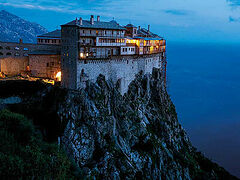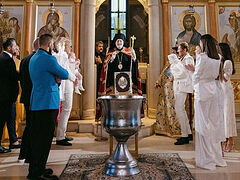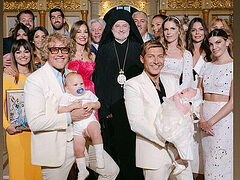As many people know, Archbishop Elpidophoros baptized two infants of a homosexual couple. There is concern that the Archbishop’s performance of the baptism could be interpreted as an attempt to normalize homosexual relations and households in the Orthodox Church.
That latter point was addressed by the Holy Community of monasteries on Mt. Athos. They released a statement condemning the baptism because it may “leave the impression that it’s possible for the Church to accept any other form of family apart from the one established by the Holy Gospel.”
In response to their statement, Rev. John Chryssavgis wrote an article entitled “Do the Gospels really worry about supporting the nuclear family? Why those removed from the world should refrain from declarations on marriage and family.” His article has several errors that could potentially confuse the Orthodox faithful. Here, I want to focus on two central untruths: that monastics shouldn’t comment on life in the world and that the concern for the nuclear family is foreign to Orthodox Christianity.
Should monks comment on worldly life?
So, where is our author correct? The primary purpose of a monk’s life is to deepen his repentance and draw closer to God in prayer. In this way of life, the monk is a model and inspiration to the laity.
Also, monks don’t live in the world, and some of them don’t understand the complexities of life in the world. Sadly, many parish priests can relate stories of laity going to monks and receiving unbearably heavy penitential or ascetical yokes. Even St. Porphyrios regretted his strict application of church canons when he was a new priest.
Admittedly, some monastics really don’t understand what it’s like to be a non-monastic. But the author’s argument is overstated. After all, monks don’t bud forth from monastery garden beds or hatch from eggs in monastic chicken coops. They come from the world. Nearly all of them join a monastery in their adulthood. Consequently, they remember—to at least some degree—what life is like in the world. And especially if they’re monks in America, many of them do worry about paying the bills and how to support their monastic family.
Regardless of a monk’s former life in the world, the author’s thesis is incorrect: life in a monastery doesn’t disqualify monastics from providing guidance to those in the world. It may, in fact, give some of them clearer insight into our worldly problems.
Let’s take our author’s logic and apply it in other areas. What if we argued that only cancer patients should be able to treat cancer? After all, only they experientially know what it’s like to have cancer. Doctors who study in Ivy League schools don’t know the pain, blood, sweat, and tears of cancer. Or what if we argued that only soldiers in the trenches should be allowed to make military decisions? After all, what do these generals know who are safely tucked away from the fear, gore, explosions, and distress of war?
Another example that we can all relate to is being in an argument. Often, calming down and detaching ourselves emotionally from the situation will help us to better see our opponent’s perspective and where we might be wrong. In other words, a certain level of detachment provides clarity in life. For that reason, non-monastics have been making pilgrimages to monasteries for numerous centuries to receive spiritual guidance (they’re called “seculars” in the Sayings of the Desert Fathers). A good monk purifies him or herself in prayer, clearing the heart of the passions. Consequently, a monk with a pure heart can often perceive truths that are hard for us non-monastics to see while we are in the struggles of life in this world.
None of this means we entrust ourselves to just anyone tonsured a monk, but there is a pedagogical role for them in the life of the Church. Additionally, the statement of the Athonite community currently in question is more than the opinion of one or two monks prying into the personal lives of seculars. It is a collective statement of an ancient body of well-respected monastics that should be judged—not by its coming forth from monastics, but by the veracity of its claims.
Is concern for the nuclear family foreign to ancient Christianity?
Another place where the author was at least partially correct is that neither the Gospels nor the patristic texts say much about family life. If anything, we seemingly hear opposition to it. Our Lord says, Do not call anyone on earth your father; for One is your Father, He who is in heaven (Matt. 23:9), and If anyone comes to Me and does not hate his father and mother, wife and children, brothers and sisters, yes, and his own life also, he cannot be My disciple (Lk. 14:6). In another place, our Lord says,
“Who is My mother, or My brothers?’ And He looked around in a circle at those who sat about Him, and said, “Here are My mother and My brothers! For whoever does the will of God is My brother and My sister and mother’”(Mk. 3:33–35).
What are we to make of these passages from the Gospels? Did our Lord and the early Church want to dissolve the nuclear family? Are we wrong in protecting it?
Our Lord did not wish to tear apart the family. After all, speaking of marriage between a man and a woman, He says, The two shall become one flesh…Therefore what God has joined together, let not man separate (Mk. 10:8-9). When it comes to family, there exists a higher dimension of reality that we must properly understand.
At the beginning of both the Divine Liturgy and the Orthodox Crowning [wedding] Service, the priest proclaims, “Blessed is the Kingdom…” Both these services are eschatological, they reveal to us the Kingdom to come. In the Divine Liturgy, we receive Christ’s Body and Blood, we are wed to Him in this beautiful wedding supper. In the Crowning Service, we are given an image of the Kingdom to come—the family is a little church, a little icon of heaven here on earth.
The seemingly harsh words of the Gospels remind us of the eschatological dimension of the nuclear family. If a family is not an icon of the church, then it has lost its purpose. We are told “call no man father,” not because God despises earthly fatherhood, but because earthly fatherhood must reflect God’s Fatherhood over us for it to be genuine. We Orthodox call our priests “father” because they model and lead us to the heavenly Father. We call our biological dads “father” because—if they’re doing it right—they reflect the loving, nurturing, protecting Father in heaven. They receive fatherhood from God’s Fatherhood.
It is the same with the nuclear family. The family reflects the relationship between Christ and His Church. Even when St. Paul gives marriage advice, he admits that he is speaking of both the nuclear family and the eschatological family. He quotes the same passage as our Lord about a man and his wife becoming one flesh. Then he states, This is a great mystery, but I speak concerning Christ and the church (Eph. 5:32). So tightly entwined with heaven are a man, his wife, and children who serve God in their household that St. Paul cannot speak of them without also speaking of Christ and the Church.
Unlike what Chryssavgis says, because the word “family” is missing from a patristic Greek lexicon isn’t a valid argument against family. Marriage, and thereby family (which is the fruit of marriage), has always been defended by Church Fathers against those who wished to force celibacy on everyone.
Until recent decades, it was generally taken for granted that the ideal secular life is for a man to wed a woman, to have children, and to raise their children in church and in the fear of God. For most centuries, defending such a concept was unnecessary.
If anything, zeal for the family needed tempering historically. The old proverb “Blood is thicker than water” exists because families would put their own needs and desires above everything else. We have Shakespeare’s Romeo and Juliet as a classic example of the destructiveness of a family-centric outlook that ignores the family’s call to be an icon of Christ and the Church.
Our Lord, His disciples, and the Church Fathers have never wanted to break apart the nuclear family except when it fails to serve its proper purpose. At those times, our Lord reminds us that—if necessary—it is better to abandon our family and seek the Kingdom. Better to be persecuted for Christ by your family than to please them by forsaking our heavenly family, the Church.
Summary
The Church has always encompassed the concept of a normal family life. It needed little defense except in those rare cases where overly zealous schismatics and ascetics attacked marital relations.
Today, the nuclear family is quite obviously under attack by Western society and political activists. For the Athonite monastics, the baptizing of children in a non-traditional family was the straw that finally broke the camel’s back. They felt the need to speak against this continual obscuring of the traditional family since it now involves the Orthodox Church and one of Her bishops. Additionally, this is not one monk’s opinion but a collective, formal statement from the Athonite monasteries.
As a final note, I want to add that the Orthodox Church is in no way attacking homosexuals. We count among our ranks numerous monastics and laity with same-sex attraction. The Orthodox Church calls everyone to a life of repentance and sexual purity regardless of their struggle or temptations. We do not condemn homosexuals or discriminate against them at the chalice if they are living in repentance. It is the same standard for everyone. More on same-sex relationships and the stance of the Orthodox Church in America can be found here.






